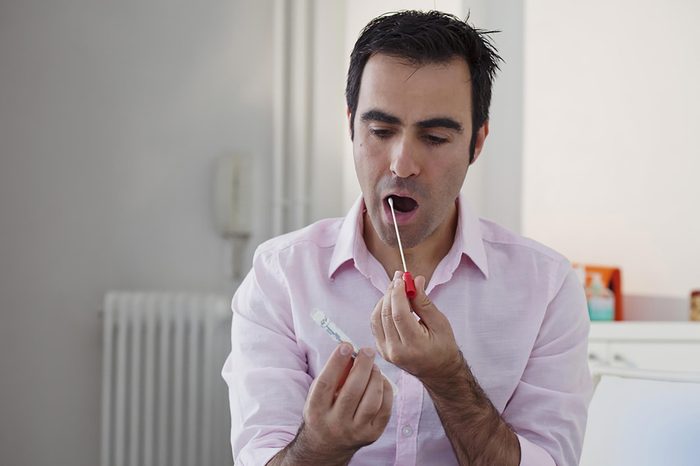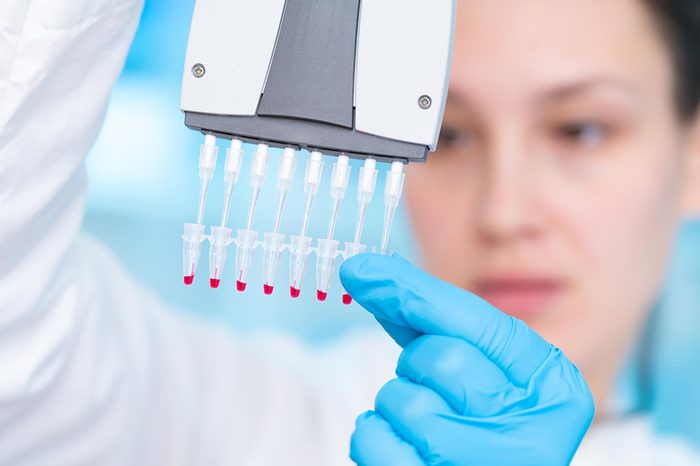
What your home DNA test can (and can’t) tell you
Direct-to-consumer (DTC) genetic tests have become popular over the past few years. These tests allow customers to get a genetic analysis of their own DNA without going through a healthcare provider. In April 2017, the Food and Drug Administration (FDA) granted the company 23andMe approval to sell consumers information about their genetic risk for 10 conditions, including Parkinson’s disease, late-onset Alzheimer’s disease, celiac disease, hereditary thrombophilia, and more. In October of 2018, the FDA also authorized them to sell reports about potential medication reactions that may be due to genetic influences.
“Healthcare is becoming more and more consumer-driven over time,” says Mary Freivogel, former president of the National Society of Genetic Counselors and cancer expert. “Direct-to-consumer genetic testing is likely here to stay and expand dramatically over the next five years.”
So what exactly can these genetic tests reveal about your health? Several companies, including 23andMe, offer genetic testing (sometimes requiring physician involvement) that shed light on wellness-related factors (like sleep and weight), carrier status (for diseases like cystic fibrosis), inherited cancer risk (like breast cancer), and even inherited traits (like eye color and food sensitivity) as well as your ancestral background.
It’s important to note that the FDA reviews DTC tests that are intended for “moderate to high risk medical purposes.” The agency reviews these tests to analyze clinical validity and the company’s claims. However, DTC tests that are non-medical or for general wellness are not reviewed before they’re offered to the public. The agency warns consumers to be cautious with DTC tests and talk with a health care provider about your results.
Now, read on to learn what your doctor isn’t telling you about these DTC tests. (Here are 7 ways your genes impact your drinking habits.)

Genetic tests can provide explanations for strange medical symptoms
Alix, a working mother in Seattle, had been troubled by symptoms of chronic fatigue, repeated illness, and “stabbing” pains in her abdomen since childhood (here are some possible medical reasons for such stomach pains). Over the years, multiple doctors were unable to find a cause. Often, she was told her the problems must be in her head.
Finally, after bad stomach pains prompted a rush to the emergency room, Alix turned to 23andMe. She ordered a kit that involves collecting a saliva sample that’s sent back to the company for a genetic analysis. The results indicated it was very likely that she has lactose intolerance. This common condition occurs when an individual lacks the enzyme to digest a sugar in milk. A lactose intolerance can lead to gastrointestinal problems. After 40 years of pain, Alix says her symptoms “all made sense.” She changed her diet to eliminate dairy. Now, Alix feels as if she has a “new body.”

DNA tests can tell you (part of) your risk for incurable, life-altering diseases
Currently, there isn’t a cure for Alzheimer’s or Parkinson’s diseases. But, some people still want to know if they have any genetic markers for the life-altering illnesses. DNA testing can provide these answers—to a point. “Developing a disease is a complex interaction of genetic factors, environmental factors, and even just pure chance,” says Freivogel. Indeed, many of the conditions DTC testing looks for, such as late-onset Alzheimer’s disease, have factors that also include lifestyle and family history, points out Kelly Querfurth Minks, a genetic counselor at the University of Rochester Medical Center.
“DTC testing reports only the presence or absence of the genetic variations associated with these conditions and cannot factor in non-genetic factors,” Minks explains. “Therefore, DTC testing can provide someone only with a risk assessment and cannot accurately predict whether someone will or will not develop the disease.” The real question is if this information you really want to know. Is this something that may be worth investigating with a genetic counselor before getting the test? (Here are the habits that can increase your dementia risk.)

What steps you can take to improve your health
It’s all well and good to know that you’re at a higher risk for heart disease or colon cancer. However, it won’t improve your life unless you take steps to act on that information. “Individuals can choose to use their DNA report to take a more active role in their health by engaging in more meaningful discussions with their healthcare provider or simply becoming more motivated to take steps to a healthier life,” says Jhulianna Cintron, a senior product specialist at 23andMe. Indeed, personal genomic testing has been “associated with modest, mostly positive changes in diet and exercise,” according to a 2017 study published in BMC Medical Genomics. (These are the health secrets your body is trying to tell you.)

DNA tests can cause unnecessary worry
DTC genetic testing can have a positive impact on your health. However, this is only when consumers can understand the results and their context correctly, says Minks. “Genetic testing, when ordered by an individual without the support of a health care professional, is potentially harmful because results may be misinterpreted and used inappropriately,” she says.
In addition, such testing could increase medical costs without much benefit, because they may lead to additional medical appointments from people wanting to know if they have any disorders that certain risks could indicate, according to Gail Jarvik, MD, PhD, a geneticist and Head of Medical Genetics at the University of Washington, Seattle. “Our clinic has already had patients asking to make appointments to have test results explained to them,” says Dr. Jarvik. “There is a shortage of medical geneticists, and many primary care providers will not be able to explain how these tests work, how reliable they are, and what the next steps should be.”
If you’re not at risk for certain diseases and conditions
DNA tests can give you some information about your risk of a certain condition or disease. But, they can also give you some peace of mind by suggesting you’re very unlikely to get it. These tests may allow you to mostly rule out some diseases with very strong genetic components. However, it’s important to note that the discovery that you don’t have a particular variant does not mean you have zero risk for a disorder, it just means it’s less likely,” says Stacey Detweiler, medical affairs associate and genetic counselor for 23andMe. “It’s important to remember that 23andMe tests can provide important genetic information but do not actually diagnose any health conditions.”

Know what to do with your results
When it comes to understanding the full implications of genetic tests, it’s best to enlist the help of a professional. “The first positive action customers can take is to share this information with their health care provider because, with their help, individuals may be able to reduce risk by managing non-genetic risk factors,” says Detweiler. “Examples of that might include modifying diet, increasing physical activity, or limiting exposure to things in their environment.” It may help to seek professional support even before purchasing a genetic test. “Consulting with a genetic counselor when pursuing genetic testing can help ensure you understand the benefits and limitations of the testing, are prepared for the results, and appreciate how those results may affect not only you, but your relatives,” says Freivogel. You can find a genetic counselor through the National Society of Genetic Counselors.

Sometimes, there’s nothing you can do with results
In some cases, testing may provide you with information you can’t do anything about. “Many conditions and diseases currently being tested for have no effective treatment or cure, and consumers should first consider their reasons and goals of testing,” says Minks. Indeed, receiving such a result could be upsetting, making it all the more important to get perspective from a pro. “Consumers who are uncomfortable with uncertainty and those who aren’t sure they would want to know their risk for a non-preventable disease should also strongly consider genetic counseling before undergoing a genetic test,” adds Freivogel.

Share your results with relatives
Keep in mind that your test results are not yours alone. “Results not only have implications for your health, but also for the health of your relatives, including aunts, uncles, and cousins,” says Freivogel. “Be prepared to share this information with your family.”